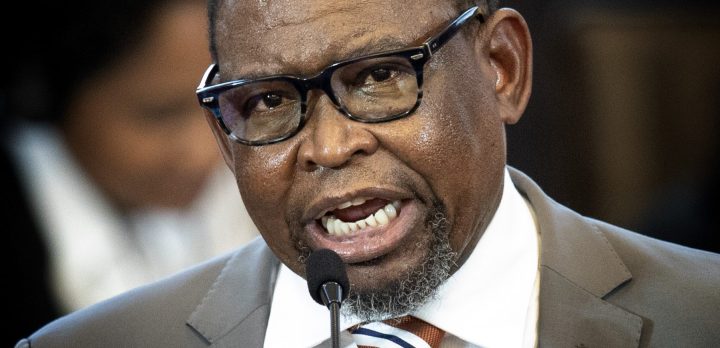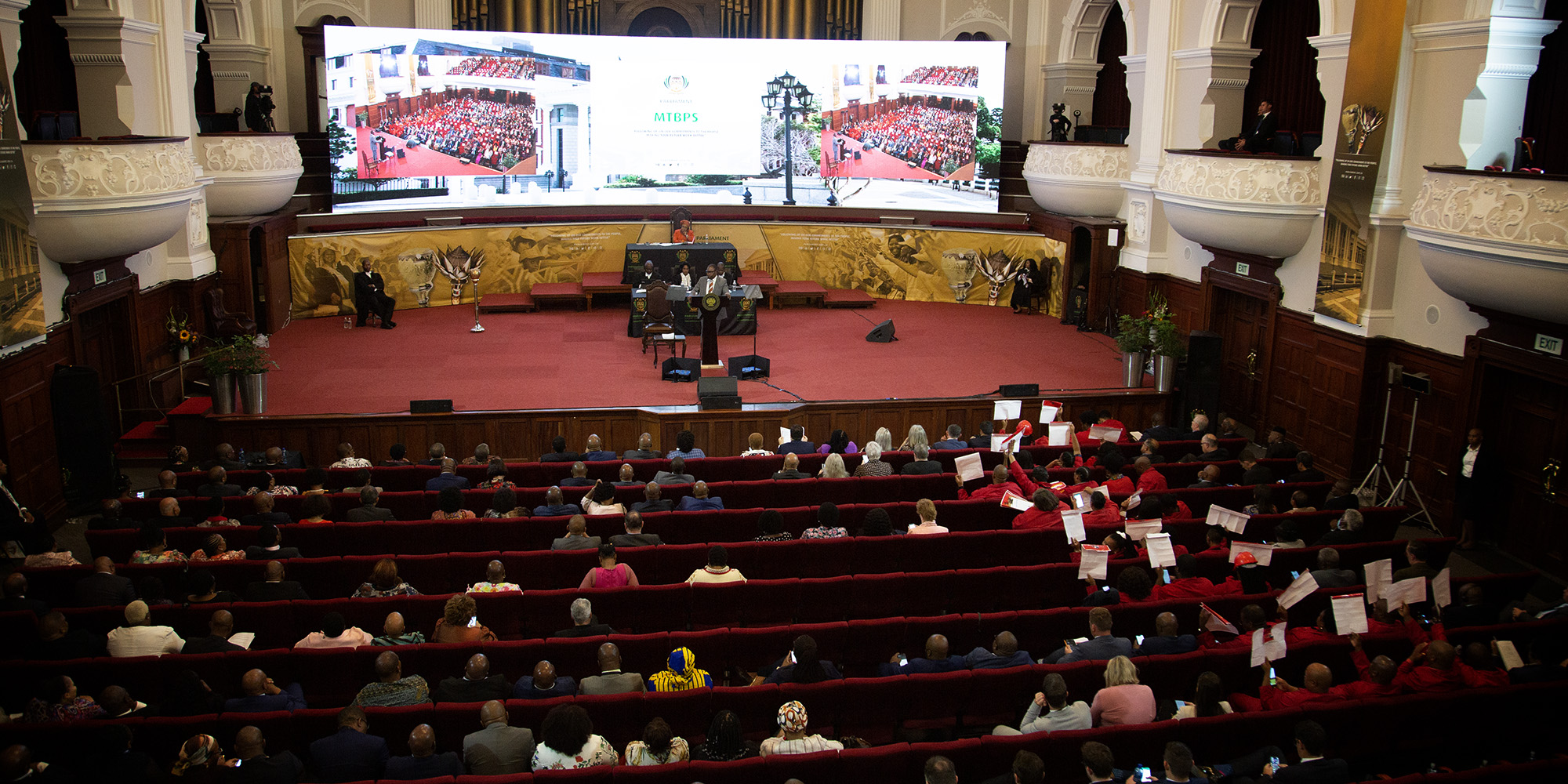ANALYSIS
Silence on Eskom and other SOEs highlights politically difficult MTBPS – and other trade-offs

‘Trade-offs’ was the word of the day in Wednesday’s Medium-Term Budget Policy Statement. It was talking up the health of public finances, even as government pledged to take over between R126-billion and R266-billion of Eskom’s debt.
It’s trade-offs between which state-owned entity (SOE) to bail out – Transnet, Denel and Sanral, yes; the Post Office and SAA, no. But it’s also trade-offs between extending the R350 Social Relief of Distress grant and inflation-related increases for other grants.
“… This is what is meant by trade-offs: balancing the need to address one priority over another,” said Finance Minister Enoch Godongwana delivering his 2022 Medium-Term Budget Policy Statement (MTBPS) at Cape Town City Hall after a short disruption by EFF MPs holding up placards related to a recent sex scandal which authorities declined to prosecute.
Godongwana seemed prepared to proceed, but National Assembly Speaker Nosiviwe Mapisa-Nqakula intervened, and a volley of points of order followed – briefly delaying the address.
Earlier, the finance minister told journalists in the traditional pre-MTBPS briefing: “If Cabinet decides instead of compensating the current grant recipients with an increase, but to provide the cake to a broader (range of people), it means trade offs…”

Economic Freedom Fighters protest by holding up placards as Finance Minister Enoch Godongwana delivers the Medium-Term Budget Policy Statement on 26 October 2022 at City Hall in Cape Town, South Africa. (Photo: Leila Dougan)
The positive official spin on the trade-offs was fiscal consolidation, with the numbers coming in better than anticipated, even if economic growth was revised down to an average of 1.6% over the next three years.
According to the MTBPS, gross debt is stabilised sooner than expected at 71.4% in the current 2022/23 financial year. The Budget deficit drops to 4.9% in 2022, and further to 3.2% by 2025. A primary Budget surplus, or revenue greater than non-interest spending, of 0.7% is expected by 2023/24.
Caution, however, was quickly raised that the numbers were looking better because of the windfall tax of R83.5-billion collected by the South African Revenue Service (Sars). And the tax collector pledged to add another R8.2-billion.
“As Sars, we accept the challenge of the revised higher revenue estimate,” said tax boss Commissioner Edward Kieswetter in a statement.
“The rebuilding of Sars is evident in improved revenue collection. We are laying a firm foundation for this new environment … We are equally committed to counter criminal and illicit activity.”
The additional revenue collection, however, has for now given government a bit of wiggle room.
It meant an easing of spending cuts as early as 2023, when another R8.9-billion becomes available for safety and security, alongside R11.3-billion for infrastructure and R66.9-billion for health education.
The SA Police Service could hire 5,000 constables for each of the three years, while the prosecution services and the Special Investigating Unit (SIU) and Financial Intelligence Centre would up the focus on fighting crime and corruption.
But while Godongwana told journalists he was “excited” about such spending prospects, it didn’t quite land.
Freedom Front Plus MP and finance spokesperson Wouter Wessels said the finance minister was disingenuous, talking better deficit, debt to gross domestic product and a positive spin.
“You can’t make any of these predictions if you don’t know what percentage of Eskom debt you take over…”
Talk of supporting the anti-corruption fight by prosecution services and the SIU did not hold up – Justice was given an additional R90-million, compared with R1.7-billion for Defence, said Wessels by telephone.
Clearly, that was another trade-off.
Visit Daily Maverick’s home page for more news, analysis and investigations
Cosatu expressed its concern over a “lukewarm” MTBPS. Welcoming the R350 grant extension to April 2024, the labour federation said in a statement that it was “puzzling” the MTBPS did not prioritise the fight against corruption.
“Suffocating the economy through budget cuts and scapegoating public servants has not worked. The government needs to focus on addressing the fundamental causes of the fiscal crisis, namely a stagnant economy, rampant corruption, massive unemployment, load shedding and limping SOEs, and not outsource the bill for corruption and incompetence to workers.”
DA MP and finance spokesperson Dion George said the more than R30-billion in bailouts to Transnet, Denel and Sanral crowd out spending that would have helped growth – and job creation.
“The greatest failing of this policy statement is its silence on how government will address the plight of the vulnerable as they battle to survive the relentlessly upward spiralling cost of living,” said George in a statement.
United Democratic Movement Chief Whip Nqabayomzi Kwankwa, in a televised interview on Newzroom Afrika, described the MTBPS as “homemade chakalaka”.
The ANC, unsurprisingly, welcomed the finance minister’s statement, from its focus on fighting corruption and hiring 15,000 constables over the next three years to the announcement the February 2023 Budget would settle the details on Eskom’s debt relief.
Despite disappointment over the lack of details, Cosatu agreed on the power utility’ debt moving to government’s balance sheet. The labour federation proposed this years ago.
Cosatu’s proposal for PIC-funded R250bn bailout and Eskom’s municipal debt take centre stage
And Business Leadership SA agreed.
“We believe that this Eskom debt transfer will ultimately have a positive effect as it will improve the SOE’s financial sustainability, allowing it to again access funding in the markets … enabling it to move closer to financial stability and provide space for it to spend on vital maintenance and new energy capacity.”
Overall, the organised business grouping was positive that the MTBPS “[affirmed] the country’s adherence to a policy of fiscal consolidation that will lead to better growth in the future” – and investment.
It may just be the broadly accepted trade-off – government taking on Eskom debt to free up monies to deal with the unprecedented protracted period of rotational power cuts.
Just about everyone, including government, agrees these rolling blackouts are damaging to any prospects South Africa may have to make a go of economic recovery and reconstruction.
Or, as Godongwana put it in a post-MTBPS televised interview with eNCA, electricity was “40% of our underperformance” and “needs to be attended to if you want to grow the economy”.
The South African Communist Party was, in its immediate response, not convinced that “tinkering … with the neo-liberal framework” would provide real solutions. Neither was the Alternative Information and Development Centre, which described the MTBPS as continuing “a neoliberal austerity agenda, including the privatisation of the country’s energy and transport systems”, while on the real numbers, slashing allocations for public health, education and employment programmes.
But flailing and failing SOEs remain a headache – and the MTBPS was a trade-off, with the South African National Roads Agency Limited (Sanral) the biggest winner with a R23.7-billion bailout.
In contrast, Transnet received R5.8-billion and Denel R204.7-million immediately, with up to R3.4-billion to follow – with conditions.
But the Sanral bailout in effect means government is taking over the e-toll debt, in a 70:30 arrangement between the national and Gauteng administrations. The provincial government remained responsible for road maintenance according to whichever way it chooses to finance that, according to the MTBPS.
Outa, formed to fight e-tolls, welcomed this step, despite confusion over the road maintenance future financing.
“This is a clear indication to Outa that the e-tolling of the Gauteng freeways will be halted, and the funding mechanism has been shifted to National Treasury and Gauteng provincial government allocations, a solution that Outa proposed to government over a decade ago,” said Outa CEO Wayne Duvenage in a statement.
Parliament was allocated R118-million for unforeseen and avoidable expenditure arising from the devastating 2 January fire. A total of R2-billion over the next three years has been pencilled in to rebuild the national legislature, according to Godongwana.
But it’s on the public wage deal that further trade-offs are looming. A total of R43.6-billion has been earmarked for civil service wage hikes, according to one of the MTBPS annexures, but the 3% government offer on the table was rejected. Industrial action is loading.
And more trade-offs could follow. DM



















WOW – this is ridiculous – throwing more good money (our money from our taxes) after bad and providing the cadres with another opportunity to loot more. No lessons learnt – or is there a knife against the throat? And then the e-toll saga. All the collected money went overseas to a company providing a massively expensive solution to a non-existent problem.